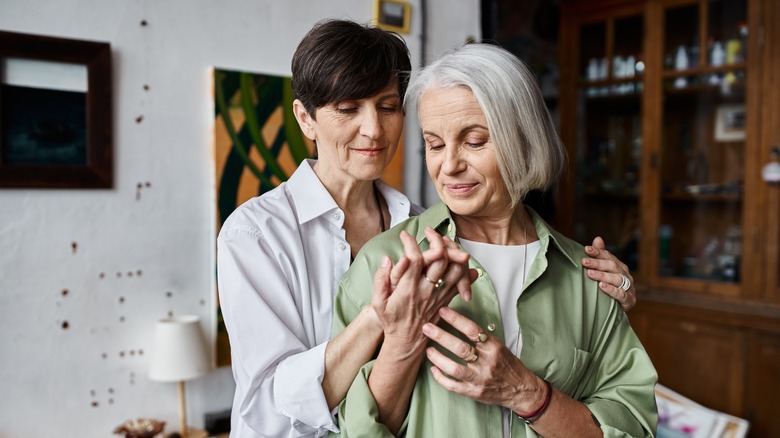Is Your Age Gap Affecting Your Sex Life? We Asked An Expert How To Deal
Although we may not see age-gap relationships often, they're certainly not uncommon. According to a 2022 Ipsos poll, 39% of Americans have dated someone with an age difference of 10 years or more. Unsurprisingly, men are more likely to date younger women, with 25% reporting having done so, compared to only 14% of women who go for younger men. Overall, an age gap doesn't appear to be an issue for many Americans, with 57% reporting they'd date someone 10 or more years older than themselves, while 49% would date someone 10 or more years younger.
But while age-gap relationships don't draw the ire and judgement they may have in the past, there are still questions about the sexual aspect of these partnerships. If you're a perimenopausal woman and your partner is younger, that age difference could be felt in the bedroom. Likewise, a 60-year-old man may no longer be able to get through the multiple rounds of sex he could have in his 20s. In other cases, it's not so much about stamina, but other factors that can impact sex in age-gap relationships.
Because age gaps can affect sex life, Women exclusively spoke to certified sex therapist and host of the "Ask A Sex Therapist" podcast Heather Shannon about how to navigate these types of issues. If age really is just a number, then it certainly shouldn't get in the way of great sex — should it? Unfortunately, there are problems that can arise.
You and your partner might be dealing with different insecurities
Even the most confident-seeming people in the world aren't without insecurities. And when it comes to age-gap relationships, certified sex therapist Heather Shannon most often sees people dealing with one of two biggies: the older partner worrying about their body and the younger partner questioning their experience. "The older partner might be thinking things like 'I need to tone up, lose some weight ... etc. to keep up with my young, sexy lover and be attractive to them,'" says Shannon. This can be a great motivator for people to take better care of themselves, she adds, unless those thoughts backfire.
"[These thoughts] can spiral into feelings of not being good enough, dysfunctional eating patterns, and self-consciousness during sex," says Shannon. "On the flip side, a younger partner might think something like 'I need to earn more, achieve more, and brush up on my sex skills to keep my sophisticated older lover satisfied,'" says Shannon. "Again, this can ... lead to the younger partner feeling not good enough and self-sabotaging the relationship."
When we allow our insecurities to take over, we're not only letting them affect us, but our relationship too. "The key is to remember what is great about you," Shannon exclusively told Women. "If we can see ourselves through our lovers eyes ... we can see how wonderful we really are. When we act from that place of deep confidence, we tend to attract and maintain great intimate relationships."
You could find yourself with mismatched libidos
When it comes to libido, sex drive is not necessarily dependent on age. Desire can be higher or lower throughout people's lives for a myriad of reasons. But while we shouldn't assume that someone over a certain age doesn't have the sex drive they had in their 20s and 30s, some common causes of low libido are connected with aging, says sex therapist Heather Shannon.
"There are people of all ages with high and low sex drives," Shannon says. "However, what we can look at are causes of the low libido, some of which may be correlated with age, which gets more specific." Lower libido could be linked to physical health, mental health, changes in hormones, or other issues, she added. "If we find some of these factors to be present, they can be addressed directly," says Shannon.
Once you discover the reasons behind a lower sex drive, then you and your partner can work together to find a way to meet in the middle. "I'd suggest finding the time of day when the lower energy partner has the most energy relatively speaking," says Shannon. "I also recommend finding sexual activities and positions that don't stress the body as much. Try slower sex in a lazy position like spooning or the cross." While sex isn't necessary for a relationship, it certainly helps keep intimacy levels high, and that's important. We need to feel that connection with our partner to maintain relationship satisfaction.
You and your partner could have different views of sex
Although our society has come a long way in regard to understanding sex and sexuality, there are still some people who are in the dark ages. While it's unfair to assume that people over a certain age don't really "get" some sex-related subjects, culture certainly has an impact on our sexuality, says sex therapist Heather Shannon. A 70-year-old man could have a very different take on sex and consent than a 25-year-old woman.
"In the past, there was way more heteronormativity and very little portrayal of queer characters in movies and on TV," says Shannon, adding that there hasn't been improvement in sex education over the years. "Now, shows like 'Sex Education' ... and 'Sex, Love & Goop' help create a more open environment for discussing sex. Activities like anal sex that used to be considered kinky are now becoming more mainstream."
If something comes up with an older partner that doesn't align with your thinking, it should be acknowledged with compassion, says Shannon. "Try to find out the meaning and the reasoning behind your partner's beliefs," she says. "Get deep and understand how certain activities or experiences may shake their sense of identity. Once you have that deep level of understanding, focus on what will work for you as a couple moving forward rather than getting hung up on differences or making your partner 'wrong' for their beliefs."



